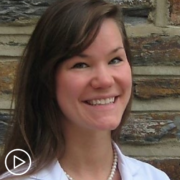Thriving with CLL: Your Role in Managing Your Care from Patient Empowerment Network on Vimeo.
How can patients thrive with chronic lymphocytic leukemia (CLL)? Dr. Jean Koff discusses CLL treatments approaches, strategies for managing disease symptoms and treatment side effects, and shares advice on how patients can be proactive in their care.
Dr. Jean Koff is an Assistant Professor in the Department of Hematology and Oncology at Winship Cancer Institute of Emory University. Learn more about Dr. Koff, here.
Download Resource Guide
See More from Thrive CLL
Related Resources:
Transcript:
Katherine Banwell:
Hello, and welcome. I’m Katherine Banwell, your host for today’s program. Today we’re going to discuss what it means to thrive with CLL. And how you can play an active role in your care. Before we meet our guest, let’s review a few important details. The reminder email you received about this program contains a link to program materials. If you haven’t already, click that link to access information to follow along during the webinar. At the end of this webinar, you’ll receive a link to a program survey. Please take a moment to provide feedback about your experience today, in order to help us plan future webinars.
And finally, before we get into the discussion, please remember that this program is not a substitute for seeking medical advice. Please speak to your healthcare team about what might be best for you. Well, let’s meet our guest today. Joining me is Dr. Jean Koff. Dr. Koff, welcome! Would you please introduce yourself?
Dr. Jean Koff:
Hi, I’m Jean Koff. I’m a lymphoma and CLL specialist from Emory University and it’s a pleasure to be with you here today.
Katherine Banwell:
Thank you for taking the time to join us. We start all of our webinar in our CLL Thrive series with the same question. In your experience, what does it mean to thrive with CLL?
Dr. Jean Koff:
So, I think thriving with CLL means that a patient is informed about their disease, they are comfortable with the physician who’s helping them navigate their disease and their management plan. And their management plan, whatever that might be, is really allowing them to focus on their life outside of CLL. So, keeping their symptoms to the absolute minimum, their physician keeping them informed about their disease progress, or lack thereof, in terms of keeping the disease at bay so they can focus on all of those things that bring them enjoyment outside of the CLL world.
Katherine Banwell:
That’s great. Thank you for your perspective. One part of thriving with CLL is managing the symptoms of the disease. What are the common symptoms of CLL?
Dr. Jean Koff:
So, one thing that I see with nearly all of my CLL patients, regardless of where they are in the CLL journey, and regardless of whether they need active medications to manage their CLL, is some degree of fatigue. And this can range from just mild fatigue that patients notice that they need a little bit of a breather in the middle of the day, to needing more sleep at night, to not being able to exercise as much as they’re used to. And that is by far one of the most common symptoms we see. Again, whether or not their disease needs medication to manage it. The classic symptoms of CLL that often let us know that it’s time to start medical management, are not just this fatigue. But the classic symptoms are B symptoms. And we describe those as fevers, night sweats, and unintentional weight loss. Those are very common. And then some patients with CLL will also have what we call palpable lymphadenopathy, which is our term for lymph nodes that are enlarged that you can feel. And the most common places to feel these on the body are on the neck, under the arms, and in the groin.
Katherine Banwell:
Okay. How are symptoms treated?
Dr. Jean Koff:
So, if your symptoms progress to the point that your doctor thinks you need medication – they’re becoming disruptive to your life, or they are getting worse and worse over time, then there are a variety of medications that we can use in CLL. And this is actually a very exciting field. Right now, the state of the field is that most patients who are starting on their first treatment for CLL will use some sort of oral medication, and that may be accompanied by an IV – what we call monoclonal antibody, or it may not. But one thing that has really changed even since I very first started practicing, is that we no longer commonly use what I would call conventional chemotherapy to treat CLL. Even though this was the standard of care just a few years ago.
Katherine Banwell:
Wow. So, a lot has changed.
Dr. Jean Koff:
Yes, definitely.
Katherine Banwell:
Why is it so important for patients with CLL to speak up and communicate with their healthcare team about some of their symptoms?
Dr. Jean Koff:
Well, for starters we want you to feel better. That’s our number one job as – as physicians, is we want to get you to feeling to – to where you are feeling like your best self. CLL or not. So, we want to make you feel better. But in CLL your symptoms are actually one of the criteria we consider when we’re thinking about whether or not we need to start a new therapy, or if you’re somebody who’s already on therapy, whether we need to change your therapy. So, it’s actually very important and your CLL doctor should be checking in with you regularly to see if you have new or worsening symptoms that might be due to your CLL.
Katherine Banwell:
Mm-hmm. It sounds like treatment of the disease is key to controlling your symptoms. So, let’s talk about treatment. Many patients are overwhelmed by the different types and classes of treatment. When is it time to treat CLL, and what are the options?
Dr. Jean Koff:
So, I boil down the criteria to when you need to treat your CLL to two main categories. One category is that the disease is progressing quickly, and the other category is the disease is causing problems of some kind, or getting ready to cause problems of some kind. Those are some of the broad categories that we think about when it’s time to start treatment for CLL. Now, this – the groups that research CLL have put out various criteria that help guide physicians about when it’s time to start treatment and some of those more specific criteria include items like symptoms. So, symptoms are a very important part of that decision-making process.
And the same symptoms that we mentioned, the B symptoms, fevers, chills, night sweats, weight loss that’s unintentional, or lymph nodes that you can feel, those would potentially be reasons that your doctor would want to start you on CLL therapy. But the CLL can cause issues even in a patient who’s not necessarily having symptoms. So, one of the most common ways that CLL can cause issues is the CLL cells can cause your other blood cells, the normal blood cells, to be low in number. There are several ways the CLL cells can do this. One of the most common ways is that the CLL cells which are often circulating through your bloodstream can also collect or overrun your bone marrow.
And if you think about it, the bone marrow is the factory that makes all of your blood cells. So, when there are too many CLL cells in the bone marrow, they can crowd out the normal blood cells, like red blood cells or platelets. So, when red blood cells or platelets get low beneath certain thresholds, that’s a reason to start CLL therapy.
Katherine Banwell:
Mm-hmm.
Dr. Jean Koff:
So, there are a couple other criteria that we think about. CLL cells can collect in other areas, including the spleen. So – and if you remember, the spleen is a lymphoid organ that sits on the left side of your body that is right below the stomach. And so, if CLL cells collect in the spleen, they can cause it to be too big, it can press on the stomach, it can make it so you feel full, even if you haven’t eaten a full meal, that’s something we call early satiety. It can be uncomfortable, causing some abdominal pain. And if the spleen gets really, really big, it can cause it to not be able to do its normal job, which is to filter out the normal blood cells like it does every day. And so, that would be a reason to start therapy as well. And then the last – the last category I would think about is in CLL we have lots of – of CLL cells that are circulating in the blood that we can check with a routine blood count. And the absolute number of CLL cells is not as important as how fast that number is growing. So, your physician will track how fast that number of CLL cells is doubling.
And if you meet criteria for what we call rapid doubling time, which is usually thought of as less than 12 months but certainly less than six months. So, if your count goes from 30,000 to 60,000 in under six months, then it may be time for you to start thinking about therapy.
Katherine Banwell:
Right. So, Dr. Koff, would you briefly review the treatment classes?
Dr. Jean Koff:
So, for first-line treatment, we have two main treatment classes that we think about at this time. The first is – is called BTK inhibitors which is Bruton tyrosine kinase inhibitors. And these are oral medications, so medications that you take by mouth, and the most well-studied of these is called ibrutinib, we typically prescribe ibrutinib by itself. There are other BTK inhibitors we are also now using in this space, one of them is called acalabrutinib and that is often given with an IV monoclonal antibody called Obinutuzumab.
The other main class of drugs that we consider for first-line treatment of CLL is the BCL-2 Inhibitors. Right now there’s only one BCL-2 Inhibitor that’s approved for CLL and front-line and it’s called venetoclax. Usually, this drug is also given in the front-line with an anti-CD20 monoclonal antibody. So, the venetoclax itself is a pill you take. And the monoclonal antibody is an – either an IV or a subcutaneous injection.
Katherine Banwell:
Where do clinical trials fit into CLL treatment?
Dr. Jean Koff:
So, clinical trials are part of the reason, a big part of the reason that we’ve been able to make so much progress in how we treat CLL over the past few years. Clinical trials are how we figure out what treatments work for CLL, how patients feel on them, what sort of adverse events or side effects they have on individual treatments, and which treatments do better for keeping CLL symptoms under control, keeping the disease under control, and allowing patients to live longer and have a higher quality of life with their disease.
Katherine Banwell:
Are there any other options available for CLL patients?
Dr. Jean Koff:
So, there are other options. A clinical trial, if that is available to you as a patient is nearly always a good thing to consider if you have CLL. Because the vast majority of patients will not be cured by CL – by their treatment for CLL. Meaning that the – even though the treatments we have usually work for a very long time in most patients, ultimately the CLL will at some point, perhaps years down the road, progress and need another therapy. For that reason, we know we can do better. And we are hoping that the next clinical trial is going to lead to the discovery of a new agent or a new combinations – new combinations of agents that will allow patients to live longer with a better quality of life with CLL.
Katherine Banwell:
Mm-hmm.
Dr. Jean Koff:
So, that’s always a good option to consider.
Katherine Banwell:
Mm-hmm. What are the common side effects of treatments, and how are they managed?
Dr. Jean Koff:
So, each of the different classes of agents has a different profile of side effects. The BTK inhibitors, the first class that I mentioned with ibrutinib and acalabrutinib, are usually very well tolerated. The most common side effects that we tend to see are things that the patients can feel or see, but also things that we can see on the labs when we’re monitoring patients. So, sometimes you can see a lower platelet counts or lower cell counts with ibrutinib. That’s something that you may not notice, but your doctor’s going to notice on the – the blood counts when you come to the office. Sometimes ibrutinib can cause a rash or GI upset, this is usually easily managed with supportive care from your physician.
And then some more – some more common effects of the BTK inhibitors include joint pain and headache. And again, many physicians, because we’ve been using BTK inhibitors for a long time, have a good regimen for treating these side effects. More uncommon side effects of BTK inhibitors, particularly ibrutinib that we look out for would be abnormal heart rhythms and some tendency for bleeding. But these are relatively uncommon and with newer BTK inhibitors, we’re seeing lower rates of these side effects.
So, in terms of venetoclax side effects we have a little bit of a different profile. This agent is much more likely to cause lower cell counts, especially in a white blood cell count known as neutrophil count, and so your doctor will be monitoring you for that. In terms of patient side effects that you can feel, it can cause a rash, it can cause some GI upset. These are usually relatively easily managed but we want you as the patient if you’re on venetoclax to talk to your doctor about these side effects so that they can help you feel better and help you manage those. In terms of the anti-CV20 monoclonal antibodies, which we use a couple in CLL more frequently, they have very similar side effect profiles.
So, one is rituximab, and one is obinutuzumab. Obinutuzumab is usually used in combination with venetoclax in front-line CLL.
Like I mentioned before, this is an infusion and most of the side effects that we think about and most commonly see in these anti-CV20s are side effects that patients have during the infusion. And these are referred to as infusion reaction. And these are relatively common, around 30 percent in these anti-CV20 monoclonal antibodies. So, what is an infusion center react – er sorry, what does an infusion reaction look like? This looks sort of like an allergic reaction.
Katherine Banwell:
Hm.
Dr. Jean Koff:
So, your nurses in the infusion center are going to be monitoring you very carefully once you start the infusion, and they’re going to start it at a low dose, very slowly. But the side effects they’re monitoring for, they’re looking for changes in your heart rate or blood pressure. You may start to feel hot or cold or sweaty, you may have chills. Sometimes patients can have swelling in their throat or their tongue. And what will happen is because these are fairly common, is we’re still able to give the anti-CV20, but what we do is the nurse will stop the infusion, they may give you some medications that calm down that infusion reaction. So, medications
like antihistamines –
Katherine Banwell:
Mm-hmm.
Dr. Jean Koff:
Or steroids that help tamp down that immune response, and then they start the anti-CV20 infusion at a lower rate. The vast majority of patients will be able to receive an anti-CV20 antibody even if they have an infusion reaction. They may just need a little bit more of those immune-tamping down medications like antihistamines and steroids. And then the last thing to consider, which I think we’ve mentioned, especially in the venetoclax-containing regimens, is the Tumor lysis syndrome. And so, that is a side effect like we mentioned is kind of like the venetoclax working really, really, really well, of the tumor breaking down too quickly.
And so, patients who have Tumor lysis, if they’re at high-risk, hopefully they’re already being monitored very closely with frequent lab draws, and they may receive medications that – that diminish the risk of adverse events happening because your electrolytes are out balance, for instance, your potassium is too high, or your calcium is too low. Because your doctors are monitoring you closely, they can give you medications that can help balance out those – those electrolytes and help protect the kidneys. The Tumor lysis is typically not a risk after the initial doses of venetoclax.
So, the first couple weeks is when we typically monitor that, and then once the CLL has been broken down, or as I like to say, once it’s been cooled off a little bit, then you no longer have this risk of Tumor lysis and it – it doesn’t require further monitoring.
Katherine Banwell:
That’s great information, thank you. What is the patient’s role in deciding on a treatment plan?
Dr. Jean Koff:
So, it’s very important that the patient be involved in deciding on a treatment plan. Especially in first-line. Because we have these two excellent classes of agents, the BTK inhibitors and the venetoclax- containing regimens. Both of them have been shown to have very good what we call efficacy in CLL, meaning that they’re able to control the disease, patient’s symptoms largely at bay for long periods of time. You know, we’re talking an average of years that – that patients are on these therapies. And they each, like I said have different side effect profiles.
And they’re given in slightly different ways. And so, right now we don’t have data from our clinical trials comparing a BTK inhibitor regimen to a venetoclax-containing regimen in CLL patients to tell us one is better than the other. And so, for that reason, a lot of the decision-making about which therapy is going to be better for you, or which therapy you would prefer, lies with the CLL patient rather than with the doctor. And the things that I ask my patients to consider, there are a couple different things. One is the side effect profile. So, patients may be more or less comfortable with certain side effects of one drug compared to another. Or there may be something in the patient’s medical history that puts them more at risk for a certain side effect than another.
The other major player in this decision-making process is how these drugs are given. So, with ibrutinib, the ibrutinib is given as a pill that you take once a day, and you take it indefinitely. Meaning you take that pill once a day for as long as it’s doing what it’s supposed to do, which is keeping your CLL under control, and as long as the patient is tolerating it well. Meaning you’re not having a lot of uncomfortable side effects from the ibrutinib. So, I have patients who have been on ibrutinib for years and years and years and years.
The venetoclax-containing regimen for patients who are getting their first-line treatment in CLL is different. It is designed as a – what we call time-limited therapy. And so, this regimen is given in – over about 12 months, 12 or 13 months, and then stopped. As long as the patient has had a good response. The other thing to consider with the venetoclax regimen, it’s not just the pill. You do take a pill every day, but you also get a – an infusion for about six months of the monoclonal antibody. Meaning that you’ll have to come into the infusion center and get an infu – an IV infusion of this drug called Obinutuzumab. The last consideration with the venetoclax regimen that differs in how it’s administered, is the venetoclax often works so well that it can break down the CLL cells a little bit too quickly.
And so, for patients who have a very, very high white count, or large lymph nodes due to their CLL, there is a risk of something we call Tumor lysis syndrome, which refers to the process where the tumor cells break down very, very quickly, and they produce molecules that are released into the bloodstream that can be dangerous if they get too high or too low. And so, sometimes, in some patients we have to monitor for the Tumor lysis syndrome by checking labs fairly frequently after we start the venetoclax. And for some patients that means they have to stay overnight for a night or two in the hospital for lab monitoring.
So, for some of my patients that I talk to about venetoclax, they say I want to stay out of the hospital, I just want to take a pill, I’m fine taking a pill, I’ll go with the BTK inhibitors. For other patients, they say I don’t want to be on a pill every single day, I will go through this year of therapy, I’m comfortable with that, and I’m happy that I’ll be able to take a break from therapy after one year. So, that ends up being a large factor in many of the conversations I have with my patients about which therapeutic approach we’re going to use in front-line therapy.
Katherine Banwell:
Hm. Dr. Koff, we received a patient question prior to the program. If I’ve had FCR for my first treatment, does that prevent me from having – or having to take an oral drug later on?
Dr. Jean Koff:
Absolutely not. So, the very first clinical trials that we did studying these regiments, especially the BTK inhibitors, were performed in patients who had received conventional chemotherapy like FCR. And what we saw is that patients who had received conventional chemotherapies and had – and needed retreatment of their CLL responded very, very well to agents like ibrutinib. And ibrutinib was able to control their disease, control their CLL, without them needing additional therapy for a long time. And that was actually the original indication for ibrutinib, was patients who had what we call relapsed CLL, often after these conventional therapies.
Katherine Banwell:
Hm. Let’s turn to medication management. Excuse me. With oral medications available to treat CLL, patients now have the role of self-administering with their treatment program. How does this work exactly?
Dr. Jean Koff:
So, just as you would receive a prescription from one of your doctors to manage your high blood pressure with a bottle of pills, you would also receive a special prescription from the doctor who is managing your CLL, a prescription for one of these oral agents. Either the BTK inhibitors or a venetoclax. And you would be – you would have the instructions on the pill bottle, just as you would you know another prescription and you would take the medication by mouth, every day, as instructed.
Katherine Banwell:
Okay. What happens if a patient forgets to take their medication? Does it impact efficacy?
Dr. Jean Koff:
So, forgetting a dose for one day, or having to skip a dose for another reason, or even a few days, shouldn’t have a major impact on controlling the CLL. And that’s true for two reasons. One, you’re going to start taking your medication again, you know fairly soon after you miss that dose. The next day. Or – or in a few days. But also, the – what we call the half-lives of these drugs are relatively long, and so you have some activity of the drug in your system in its ability to control the CLL, even though you haven’t taken the dose that you missed that day. In fact, sometimes we have to hold CLL medications.
Maybe you’re getting a procedure, some sort of surgical procedure, and you might be at an increased risk of bleeding just in the day or two before and after that surgical procedure, so we would actually recommend that you hold a BTK inhibitor, if that was what you were receiving for your CLL, and then resume it once your risk of bleed had gone down a few days after the surgery.
Katherine Banwell:
Hm.
Dr. Jean Koff:
We do recommend that if you are going to miss a dose of your medication that you let your clinical team know, just so they can instruct you on how to resume your dose if you haven’t already gotten instructions from them about that.
Katherine Banwell:
Okay. That’s really helpful information. What strategies are there to keep on schedule and remember to take the medication on time and regularly?
Dr. Jean Koff:
So, I think these strategies are good whether you have CLL or some other type of disorder that you’re taking medication for. My patients often use labeled pill boxes with days of the week and a.m. and p.m., so that you know whether you took your pill that day and what time of day you took it. And so, setting that out for the week can be very helpful in organizing and making sure that you can check back and remind yourself whether or not you took your pill.
Katherine Banwell:
How are patients monitored during treatment?
Dr. Jean Koff:
So, your doctor is going to monitor you more closely when you first start a medication. So, I typically monitor my patients within one or two weeks of them starting an oral drug. One to make sure that they’re feeling okay on it, that they’re not having any side effects when they first start, but also to check lab values and make sure that the – the oral medication isn’t causing any problems with their blood counts or with other labs. Then, once we’ve established that they’re doing well on the medication, maybe they’ve come in every couple weeks for a month or six weeks, we start to space out those visits.
I usually see my patients who are on active therapy about every three to six months to check and see whether they’re feeling okay, whether they’re having any side effects from the medicines, like I said to check their labs, make sure the medications aren’t causing any lab abnormalities. And also in the longer term, to make sure that their CLL is under good control on – on the medications. Because that’s one of our main goals is to keep the CLL under good control.
Katherine Banwell:
We received another patient question prior to the program. Has there been any progress in helping CLL patients get a better reaction from COVID vaccines?
Dr. Jean Koff:
That is a great question, and that is one that is near and dear to my heart and my colleagues at – at Emory. You raise a really good point, which is that CLL patients have altered immune systems just by virtue of their CLL. The CLL cells exert their influence on other immune cells and can cause your immune system not to respond to infections or immunizations the way it normally would. That’s without any medication in the mix. Now, when we look at patients who are on medications like the ones we’ve been talking about, the BTK inhibitors, venetoclax, but especially the monoclonal antibodies that react against CD20, we see that those patients really do not have an optimal response to vaccines, especially the COVID vaccine.
Meaning, that patients who receive the COVID vaccine while they’re on that therapy, or even within twelve months of receiving a monoclonal antibody, often don’t mount the same strong immune response as somebody who’s not on those therapies. So, luckily, we – we don’t have to just depend on the vaccines. I still recommend that my patients get vaccinated, because it is safe and it might impart a little bit of efficacy, and it’s certainly more effective than not getting the vaccine. But we also have other approaches to increasing your protection against COVID, including the – the injection called Evusheld, which can help protect patients specifically whose immune systems are not completely normal and are not expected to mount a strong response to COVID vaccines.
So, that is definitely a discussion to have with your doctor about how your medications impact your protection from COVID, from vaccines, and whether there are other medications that might be used to help increase your protection.
Katherine Banwell:
That’s great advice. Dr. Koff I’d like to get your thoughts on where we stand with progress with helping people live longer and truly thrive with CLL. What would you like to leave the audience with?
Dr. Jean Koff:
So, I think that one thing to remember with CLL is over the past few years we’ve seen an explosion in how we manage the disease because we have newer agents and therapeutic combinations that are helping people control their CLL for much longer than was possible 10 or 15 years ago. We still have a long way to go because ideally, we want every patient to be able to control their CLL and thrive with CLL for as long as possible. And, right now like I said before, we are not curing patients yet. Meaning that we don’t have a therapy that can get rid of the CLL, make it go away, and keep it away forever.
That’s where clinical trials come in. That’s where we are able to make progress, is we’re able to study what therapies work, what therapies don’t, how they perform against each other, how they make patients feel, and what sort of side effects might be associated with them. And so, that’s really the next step, is continuing the work that has already been done in clinical trials and exploring these new therapeutical approaches.
Katherine Banwell:
Dr. Koff, thank you so much for taking the time to join us today.
Dr. Jean Koff:
Thank you for having me.
Katherine Banwell:
And thank you to all of our collaborators. If you would like to watch this webinar again, there will be a replay available soon. You’ll receive an email when it’s ready. And don’t forget to take the survey immediately following this webinar. It will help us as we plan future programs. To learn more about CLL and to access tools to help you become a more proactive patient, visit powerfulpatients.org. I’m Katherine Banwell. Thanks so much for being with us today.










